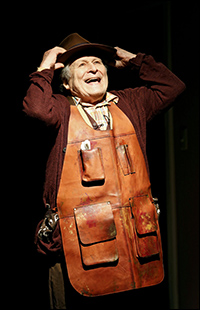
*
The New York premiere of Lauren Yee's drama, currently playing at the Peter Jay Sharp Theatre, follows a young woman after she and her boyfriend move in together and struggle to create a new home. As she tries to become comfortable in the apartment, the walls begin talking to her, revealing the tale of previous tenants, a hatmaker and his long-suffering wife. Tired of feeling taken for granted, the wife runs away with her husband's favorite hat.
Directed by Rachel Chavkin, The Hatmaker's Wife features Margulies as Hetchman, the titular character, while Friedman plays his best friend, Meckel.
Margulies, whose numerous stage credits include Wonderful Town, Angels in America, Brighton Beach Memoirs and The Iceman Cometh, was drawn to Yee's original approach to storytelling. "Maybe there's nothing quite like it," he said. "She thinks in a most personal, fantastic and yet deeply emotional way about life. And yet, it's a comedy and it moves in and out of different kinds of realities."
"I love the fable quality of it, the gentle quality of it and the sad quality of it — and the silliness of it," Friedman, a Tony nominee for his role in Ragtime who has also performed in Twelve Angry Men, The Heidi Chronicles and Piaf, said. Describing the play as "whimsical," he added, "It's a style of play that I hadn't done very much of." Margulies and Friedman, whose characters in The Hatmaker's Wife are best friends, have known each other for years and also shared the stage in After the Revolution at Playwrights Horizons. It wasn't difficult for the two actors to build rapport onstage, playing long-time friends, a fact that they credited to the nature of the business offstage.
"That's one of the great things about the New York community. A lot of us know each other," Margulies said. "So the foundation is actually knowing that there is a past history. You're basing it on a kind of association and even a kind of style."
"You keep building family after family," Friedman said of the relationships formed offstage. "It's wonderful as it happens and sad when it's the end of the run. Nowadays, I keep in touch with people. Everybody is so intent on the work and loving what they're doing." Friedman spoke highly of his fellow actors, saying, "I can't remember the last jerk I worked with. It's been over a decade!"
 |
||
| David Margulies |
||
| Photo by Carol Rosegg |
The relationship between Margulies and Friedman is not the only one in Yee's play; The Hatmaker's Wife also addresses romantic relationships — and the dissatisfaction that can linger within them.
"This woman is a young woman, but I think she has a real knowledge about how difficult love is, and how we are all in some way limited in our ability to love — by what we've been through, what we've come from," Margulies said of Yee. "[The play] is saying something sad and true about how we take each other for granted, and how we'll be sorry if we do that, and how we're important to each other, even though we can't realize it at the moment," Friedman added.
The passage of time is another theme in The Hatmaker's Wife, which both Margulies and Friedman commented on.
"We try to get beyond it in certain ways...there are real changes in the play. It's not static in its emotional understanding. The play recognizes that time passes and that we're all affected by what happened to us," Margulies said. Friedman, however, commented, "Time really isn't passing. The past is present, and we're all living at the same time. There's a piece of the past in today." As time has passed throughout their extensive careers, both Margulies and Friedman have seen changes take place in the theatre industry. Margulies commented on the evolution of the city itself, with both actors and theatres located farther and farther out in Brooklyn, resulting in changes in audience demographics, while Friedman spoke of the new works being produced Off-Broadway.
"I'm happier today than I can remember being," Friedman said of his recent work. "I have interesting scripts that are coming in. I'm reading great stuff by a really wonderful new generation of writers. I'm seeing some really swell things. Nothing's boring. There's some very new stuff going on, and people looking at how relationships are portrayed onstage is wonderful."
One relationship in The Hatmaker's Wife that does not differ from Margulies' life offstage is his character's fondness for hats. He developed an affinity for them when he began balding and is now known as "the hat man" in the elevator of his building. Much to his amusement, he has developed a reputation as a fashionable dresser, when the majority of his hats were purchased off tables on the street for a few dollars.
"I'm always in some hat," Margulies said. "I'm complimented on the street by strangers on these inexpensive straw hats."
While art may be imitating life in some regards in The Hatmaker's Wife, both Margulies and Friedman expressed hope that the play would affect its audience.
"That's one of the great things about art — it can touch on these things and awaken responses in the audience that make them maybe more conscious of something in themselves, in their own lives, that they didn't expect when they went into the theatre," Margulies said.










